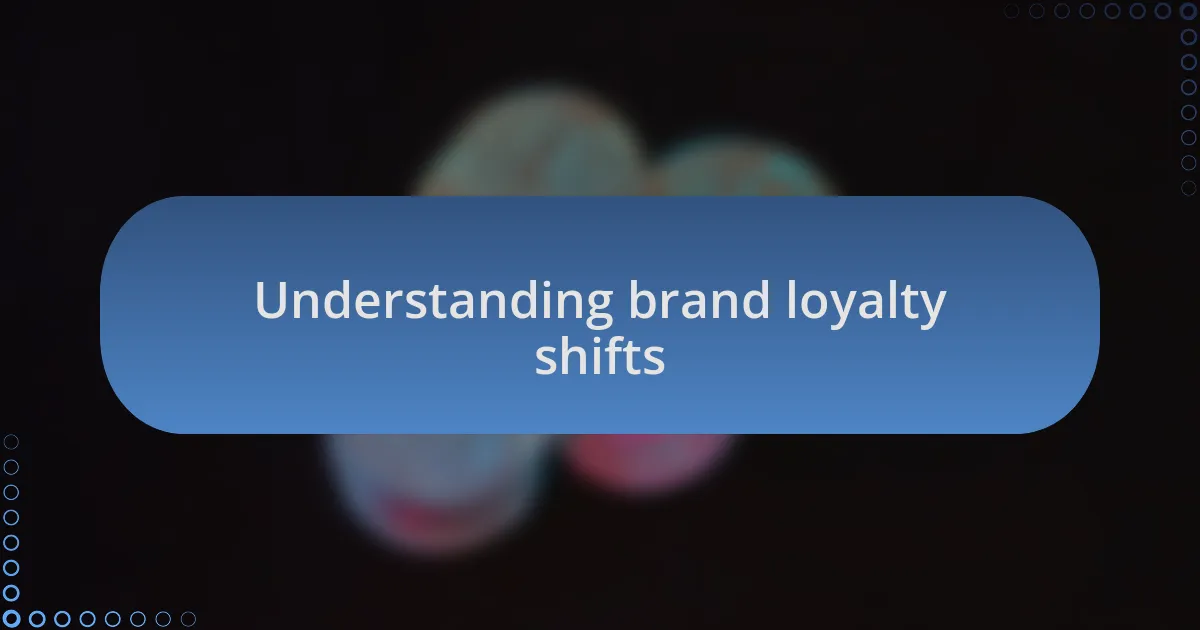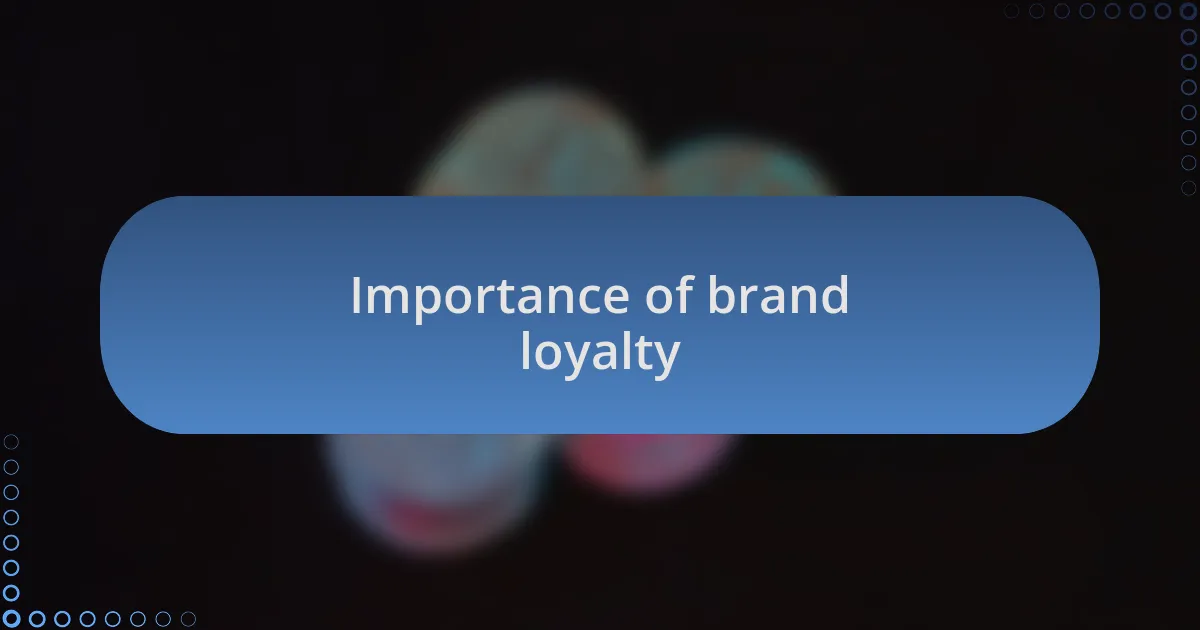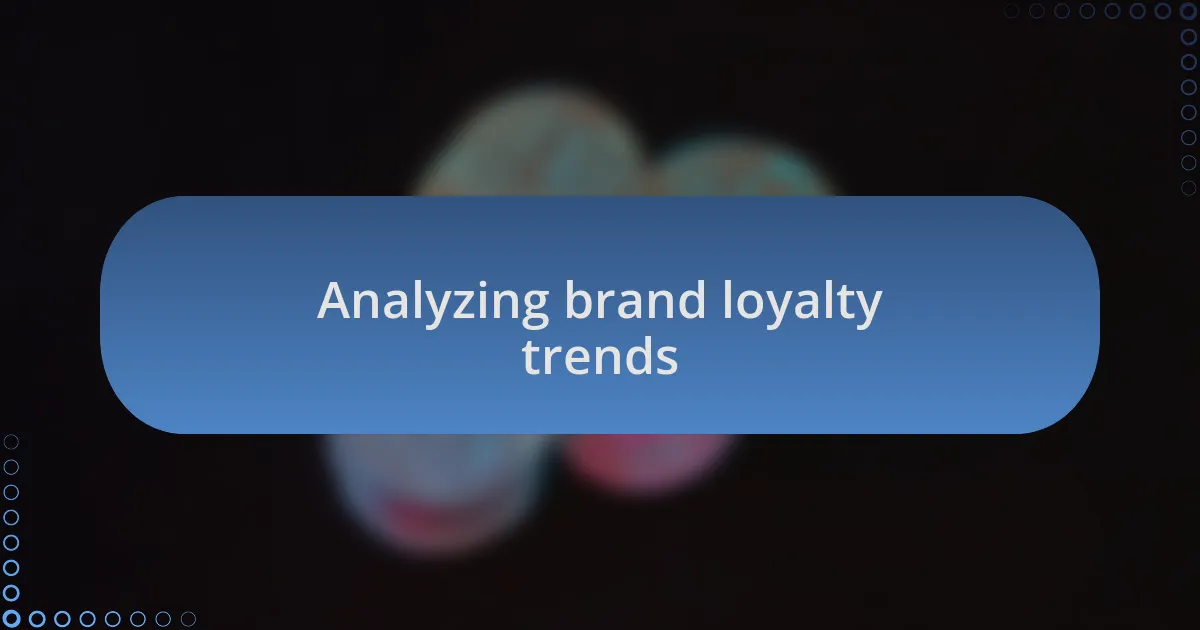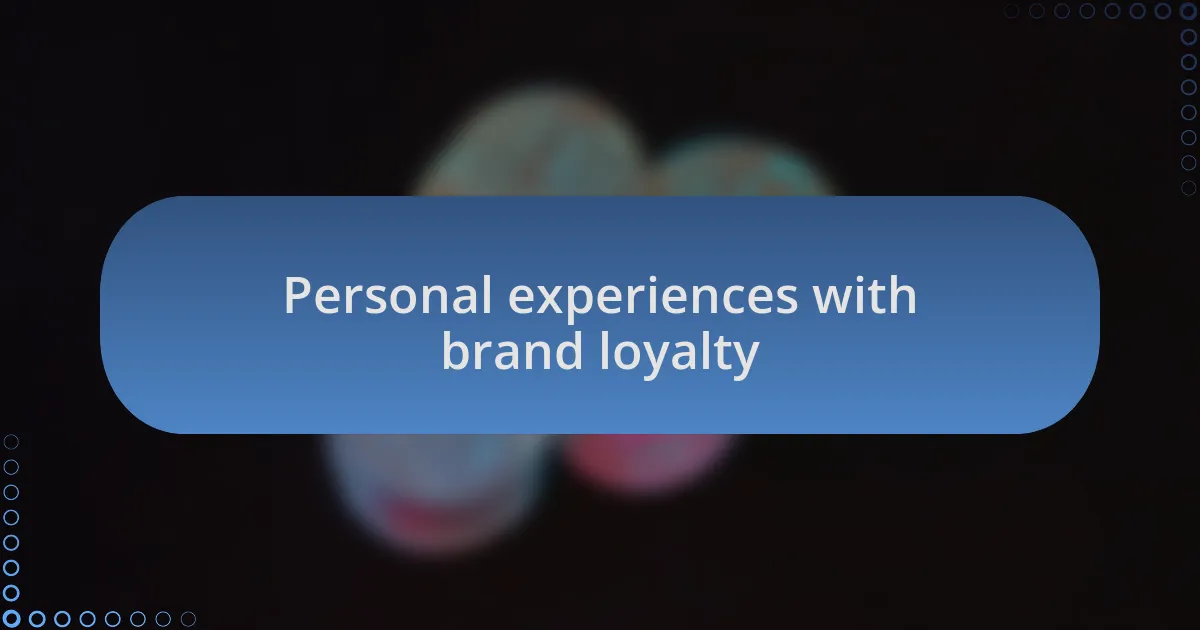Key takeaways:
- Brand loyalty is highly susceptible to changes in consumer experience and public perception, influenced by factors like customer service and social media sentiment.
- Emotional connections and shared values significantly drive consumer loyalty; brands that resonate with customers on a personal level foster lasting relationships.
- Loyalty is dynamic and can shift rapidly; brands must be conscious of their practices and maintain transparency to retain consumer trust.
- Consumers are increasingly prioritizing authenticity and ethical practices over legacy, highlighting the need for brands to align with their audience’s values.

Understanding brand loyalty shifts
Brand loyalty shifts often arise from changes in consumer behavior and market dynamics. I’ve noticed that even small events, like a customer service blunder or a competitor’s innovative product, can trigger a reevaluation of loyalty. Have you ever found yourself questioning your brand preferences after a disappointing experience?
As I reflect on my own experiences, I’ve seen how quickly a brand can lose my trust. For instance, after a misstep with one tech company’s pricing model, I found myself exploring alternatives. This moment really emphasized to me how crucial it is for brands to stay in tune with their customers’ values and expectations.
Moreover, the rise of social media has amplified these loyalty shifts. It’s startling how quickly a brand can rise or fall based on public sentiment. Have you ever changed your perspective on a brand after reading reviews online? I surely have, and it highlights the need for brands to maintain transparent communication and foster genuine relationships with their audience.

Importance of brand loyalty
Brand loyalty is a cornerstone of sustainable business success. When consumers trust a brand, they’re not just buying a product; they’re buying an experience and a promise of quality. I remember my unwavering loyalty to a coffee brand that always delivered my favorite flavor. When they introduced a seasonal blend that didn’t hit the mark, I felt a mix of disappointment and confusion. It made me realize just how much my emotional investment in that brand influenced my purchasing decisions.
The emotional connection consumers have with brands often drives repeat purchases. I can recall a time when I chose a skincare line because it was linked to a charity I cared about. That commitment not only made me a loyal customer but also a brand ambassador, sharing my positive experiences with friends. This shows that loyalty isn’t just transactional; it’s relational. It raises a question: how can brands actively foster these connections to enhance loyalty in a crowded market?
Mentally, I often equate brand loyalty with a sense of belonging. There’s something comforting about always reaching for that familiar product during my shopping trips. For instance, when a beloved snack changed its recipe, it felt like a betrayal, and I swiftly sought alternatives. This underscores the idea that brands must consistently meet or exceed expectations, reinforcing that loyalty is built on trust and satisfaction. Are brands aware of the emotional stakes at play in their market strategies? They should be, as these elements hold the key to maintaining loyal customers.

Analyzing brand loyalty trends
Analyzing brand loyalty trends reveals a fascinating shift in consumer behavior. I’ve noticed that as more options become available, shoppers aren’t just sticking with the familiar; they’re willing to explore new brands that resonate with their values. For instance, I recently switched to a brand of athletic gear not solely for quality but because they actively support environmental initiatives. It made me question: how many consumers may be swayed by values over legacy when faced with a choice?
Moreover, loyalty is increasingly influenced by the brands’ perceived authenticity and transparency. I recall purchasing from a tech company known for its ethical practices, even when alternatives were cheaper. It wasn’t just about being loyal; it felt good to support a brand that aligns with my principles. This trend illustrates that brands need to show their integrity to retain loyalty in an era where customers are becoming more discerning.
Finally, I’ve seen how loyalty isn’t static—it’s dynamic and can shift instantly with one misstep. A friend of mine was a die-hard fan of a specific phone brand until a recent scandal broke regarding their treatment of workers. Suddenly, loyalty turned to mistrust. This emphasizes the delicate balance brands must maintain; one bad move might lead to a loyal customer exploring other options. Are brands prepared to navigate this changing landscape of loyalty, or are they underestimating the power of informed consumers?

Personal experiences with brand loyalty
Brand loyalty often feels like a two-way street, and I’ve experienced it firsthand. Years ago, I was fiercely loyal to a specific brand of chocolate because it brought me comfort during stressful times. However, after learning that their sourcing practices weren’t fair-trade certified, I found it hard to enjoy their products as I once did. It left me wondering: can we maintain loyalty when our values conflict with the brands we love?
I also had a moment not too long ago when a once-preferred coffee shop changed their product lineup. They removed my favorite blend, which had not only been a daily ritual but an emotional anchor for me. Instead of sticking around and adapting, I found myself trying out various local cafes. This experience showed me how quickly allegiance can diminish when a brand makes choices that don’t resonate personally. It’s intriguing to reflect on how our preferences can pivot based on such small yet significant changes.
Then there’s the time I faced disappointment with a popular cosmetic brand. After a long history of trusting their quality, I was outraged when they advertised a campaign that ran contrary to their earlier commitments on diversity and inclusion. That one decision shattered my loyalty, pushing me to reconsider all my past purchases from them. I often ponder whether brands fully grasp the emotional weight of consumer loyalty and how quickly it can evaporate with a single misalignment.